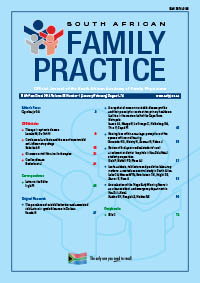A snapshot of noncommunicable disease profiles and their prescription costs at ten primary healthcare facilities in the in the western half of the Cape Town Metropole
Keywords:
noncommunicable diseases, prescriptions, primary health care, costs, co-morbidity
Abstract
Objectives: There has been a rapid increase in the prevalence of noncommunicable diseases globally. It is thought that this increase will have the greatest impact on developing countries, such as South Africa, where it will adversely affect quality of life and increase healthcare costs. This research was conducted to determine the disease profile and cost of treating patients at 10 facilities in the western half of the Cape Town Metropole. Design: An analytical, cross-sectional study was carried out in order to interpret the cost of the medication in relation to the patient disease profile. Setting and subjects: Data were collected from 10 facilities in the western half of the Cape Town Metropole over a three-month period. Outcome measure: The outcome measure was the disease profile of patients attending the facilities and the cost of prescriptions for these patients. Results: Most patient visits to the community health centres were to treat chronic diseases (82%). The disease profile of patients was as follows: 58.96% had hypertension, 19.67% diabetes, 12.14% asthma and chronic obstructive pulmonary disease, and 21.80% arthritis. It was found that 65% of patients with a chronic condition had co-morbidities. The cost of prescriptions was significantly higher (p-value < 0.001) for chronic conditions than for acute conditions. The number of comorbidities per patient also influenced the cost of the prescriptions. Conclusion: The results indicated that most of the adults attending public sector facilities in the western half of the Cape Town Metropole have chronic diseases and that the cost of treating these conditions is significantly greater than that of treating acute conditions. An integrated approach to the management of chronic diseases is important in low-resource settings for the efficient utilisation of limited resources.
Published
2013-08-01
Section
Original Research
By submitting manuscripts to SAFP, authors of original articles are assigning copyright to the South African Academy of Family Physicians. Copyright of review articles are assigned to the Publisher, Medpharm Publications (Pty) Ltd, unless otherwise specified. Authors may use their own work after publication without written permission, provided they acknowledge the original source. Individuals and academic institutions may freely copy and distribute articles published in SAFP for educational and research purposes without obtaining permission.

